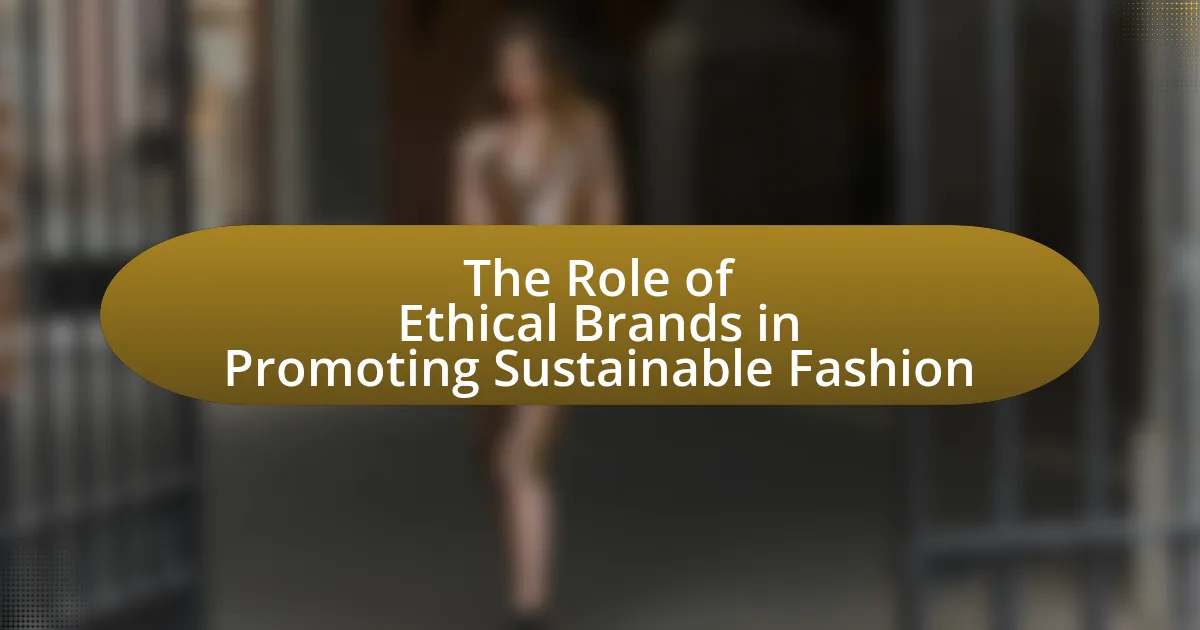Ethical brands are pivotal in advancing sustainable fashion by emphasizing environmentally friendly practices and fair labor conditions. They utilize sustainable materials, advocate for transparency in supply chains, and promote social equity, significantly reducing the fashion industry’s environmental impact. The article explores how ethical brands define sustainable fashion, the principles guiding their practices, and the challenges they face, including consumer skepticism and high production costs. Additionally, it examines the influence of ethical brands on consumer behavior, the role of technology and e-commerce in enhancing sustainability, and the importance of collaboration and consumer feedback in shaping their evolution.

What is the Role of Ethical Brands in Promoting Sustainable Fashion?
Ethical brands play a crucial role in promoting sustainable fashion by prioritizing environmentally friendly practices and fair labor conditions. These brands often utilize sustainable materials, such as organic cotton or recycled fabrics, which significantly reduce environmental impact compared to conventional materials. For instance, a report by the Global Fashion Agenda indicates that sustainable practices can reduce greenhouse gas emissions by up to 30% in the fashion industry. Additionally, ethical brands advocate for transparency in their supply chains, ensuring that workers are treated fairly and paid livable wages. This commitment not only fosters consumer trust but also encourages other brands to adopt similar sustainable practices, thereby amplifying the movement towards a more responsible fashion industry.
How do ethical brands define sustainable fashion?
Ethical brands define sustainable fashion as a practice that prioritizes environmental protection, social equity, and economic viability throughout the entire lifecycle of a garment. This definition encompasses the use of eco-friendly materials, fair labor practices, and transparent supply chains, ensuring that both people and the planet are respected. For instance, brands like Patagonia and Eileen Fisher emphasize the importance of using organic cotton and recycled materials, which significantly reduce environmental impact. Additionally, ethical brands often engage in initiatives that support fair wages and safe working conditions for garment workers, aligning their business practices with the principles of sustainability.
What principles guide ethical brands in the fashion industry?
Ethical brands in the fashion industry are guided by principles such as sustainability, transparency, fair labor practices, and animal welfare. Sustainability focuses on minimizing environmental impact through eco-friendly materials and production processes. Transparency involves openly sharing information about sourcing, manufacturing, and labor conditions, allowing consumers to make informed choices. Fair labor practices ensure that workers receive fair wages and safe working conditions, promoting social equity. Animal welfare principles advocate for humane treatment of animals used in fashion, including the prohibition of fur and unethical sourcing of materials. These principles collectively contribute to a more responsible and ethical fashion industry.
How do ethical brands differentiate themselves from traditional fashion brands?
Ethical brands differentiate themselves from traditional fashion brands by prioritizing sustainability, transparency, and social responsibility in their business practices. Unlike traditional brands that often focus solely on profit maximization, ethical brands implement eco-friendly materials, fair labor practices, and supply chain transparency. For instance, a study by the Ethical Fashion Forum indicates that 66% of consumers are willing to pay more for sustainable products, highlighting the growing demand for ethical practices in fashion. This commitment to ethical standards not only attracts conscious consumers but also fosters brand loyalty, setting ethical brands apart in a competitive market.
Why is the role of ethical brands important in the fashion industry?
The role of ethical brands is crucial in the fashion industry because they promote sustainability and social responsibility. Ethical brands prioritize environmentally friendly practices, such as using organic materials and reducing waste, which helps mitigate the fashion industry’s significant environmental impact. For instance, the fashion industry is responsible for approximately 10% of global carbon emissions, highlighting the need for sustainable practices. Additionally, ethical brands often ensure fair labor practices, addressing issues like exploitation and unsafe working conditions, which are prevalent in fast fashion. By choosing ethical brands, consumers can support a shift towards a more sustainable and equitable fashion industry.
What impact do ethical brands have on consumer behavior?
Ethical brands significantly influence consumer behavior by increasing purchase intentions and fostering brand loyalty. Research indicates that consumers are more likely to buy from brands that demonstrate social responsibility and ethical practices, with 66% of global consumers willing to pay more for sustainable brands, according to a Nielsen report. This shift in consumer preferences is driven by a growing awareness of environmental and social issues, leading to a demand for transparency and ethical sourcing in fashion. Consequently, ethical brands not only attract a dedicated customer base but also encourage consumers to align their purchasing decisions with their values, reinforcing the importance of sustainability in the fashion industry.
How do ethical brands contribute to environmental sustainability?
Ethical brands contribute to environmental sustainability by prioritizing eco-friendly materials and sustainable production practices. These brands often utilize organic, recycled, or biodegradable materials, which reduce waste and pollution. For instance, a study published in the Journal of Cleaner Production found that using organic cotton can reduce water consumption by up to 91% compared to conventional cotton farming. Additionally, ethical brands typically implement fair labor practices and minimize their carbon footprint through local sourcing and efficient manufacturing processes. This holistic approach not only supports environmental health but also promotes social responsibility, creating a positive impact on both the planet and communities.
What challenges do ethical brands face in promoting sustainable fashion?
Ethical brands face significant challenges in promoting sustainable fashion, primarily due to consumer skepticism and high production costs. Consumer skepticism arises from a lack of trust in claims made by brands, as studies indicate that 66% of consumers are concerned about greenwashing, where brands falsely promote their products as environmentally friendly. High production costs stem from sourcing sustainable materials and implementing ethical labor practices, which can lead to higher retail prices that deter price-sensitive consumers. Additionally, ethical brands often struggle with limited marketing budgets, making it difficult to effectively communicate their values and reach a broader audience.
How do market perceptions affect the success of ethical brands?
Market perceptions significantly influence the success of ethical brands by shaping consumer trust and purchasing decisions. When consumers perceive a brand as genuinely ethical, they are more likely to support it, leading to increased sales and brand loyalty. For instance, a 2021 study by Nielsen found that 66% of global consumers are willing to pay more for sustainable brands, indicating that positive market perceptions can directly enhance a brand’s financial performance. Additionally, ethical brands that effectively communicate their values and practices can differentiate themselves in a crowded market, attracting a dedicated customer base that prioritizes sustainability.
What are the financial challenges for ethical brands in the fashion industry?
Ethical brands in the fashion industry face significant financial challenges, primarily due to higher production costs associated with sustainable materials and fair labor practices. These brands often invest in eco-friendly materials, which can be up to 30% more expensive than conventional fabrics, leading to increased retail prices that may deter price-sensitive consumers. Additionally, ethical brands frequently operate on smaller scales, limiting their ability to achieve economies of scale that larger, conventional brands benefit from. This results in reduced profit margins and financial instability. Furthermore, ethical brands may struggle with market penetration, as they compete against well-established brands with extensive marketing budgets, making it difficult to gain visibility and attract a loyal customer base.

How do Ethical Brands Influence Consumer Choices?
Ethical brands influence consumer choices by aligning their values with the growing demand for sustainability and social responsibility. Research indicates that 66% of global consumers are willing to pay more for sustainable brands, demonstrating a clear preference for ethical practices in purchasing decisions. Additionally, ethical brands often engage in transparent supply chains and fair labor practices, which resonate with consumers’ desire for authenticity and integrity in their purchases. This alignment not only enhances brand loyalty but also drives consumers to advocate for these brands, further amplifying their influence in the market.
What factors drive consumers to choose ethical brands over conventional ones?
Consumers choose ethical brands over conventional ones primarily due to a growing awareness of social and environmental issues. This awareness drives preferences for brands that demonstrate transparency, sustainability, and fair labor practices. Research indicates that 66% of global consumers are willing to pay more for sustainable brands, highlighting a significant shift in purchasing behavior towards ethical considerations. Additionally, the desire for authenticity and alignment with personal values further influences consumer choices, as individuals increasingly seek to support brands that reflect their ethical beliefs.
How does transparency in sourcing affect consumer trust?
Transparency in sourcing significantly enhances consumer trust. When brands openly share information about their supply chains, including sourcing practices, materials used, and labor conditions, consumers feel more informed and empowered in their purchasing decisions. A study by Label Insight found that 94% of consumers are more likely to be loyal to a brand that offers complete transparency. This trust is further reinforced when brands demonstrate ethical practices, as consumers increasingly prioritize sustainability and ethical considerations in their buying behavior. Thus, transparency in sourcing not only builds trust but also aligns with the growing demand for responsible consumption in the fashion industry.
What role does social media play in promoting ethical brands?
Social media plays a crucial role in promoting ethical brands by providing a platform for direct engagement and communication with consumers. This engagement allows ethical brands to share their values, practices, and stories, fostering transparency and trust. For instance, a study by the Global Web Index found that 54% of social media users use these platforms to research products, indicating that ethical brands can effectively reach and influence potential customers through targeted content. Additionally, social media facilitates community building among consumers who prioritize sustainability, amplifying brand messages through user-generated content and peer recommendations. This organic promotion can significantly enhance brand visibility and credibility in the competitive sustainable fashion market.
How do ethical brands educate consumers about sustainable fashion?
Ethical brands educate consumers about sustainable fashion through transparent communication, educational campaigns, and engaging storytelling. These brands often provide detailed information about their sourcing practices, production processes, and the environmental impact of their materials, which helps consumers make informed choices. For instance, brands like Patagonia and Everlane utilize their websites and social media platforms to share insights on sustainability, including the benefits of organic materials and fair labor practices. Research indicates that 66% of consumers are willing to pay more for sustainable brands, highlighting the effectiveness of these educational efforts in influencing purchasing decisions.
What strategies do ethical brands use to raise awareness?
Ethical brands raise awareness through transparent storytelling, social media engagement, and partnerships with influencers. Transparent storytelling allows brands to communicate their values and practices, fostering trust with consumers; for instance, brands like Patagonia share their supply chain processes to highlight sustainability efforts. Social media engagement enables direct interaction with audiences, where brands can showcase their ethical practices and connect with like-minded individuals, as seen with brands like Everlane, which uses platforms like Instagram to share behind-the-scenes content. Additionally, partnerships with influencers amplify their message, reaching broader audiences; for example, ethical fashion brands often collaborate with eco-conscious influencers to promote their products and values, effectively increasing visibility and awareness.
How effective are campaigns in changing consumer perceptions?
Campaigns are highly effective in changing consumer perceptions, particularly in the context of ethical brands promoting sustainable fashion. Research indicates that well-structured campaigns can significantly influence consumer attitudes and behaviors, with studies showing that 70% of consumers are more likely to purchase from brands that demonstrate a commitment to sustainability. For instance, a study by Nielsen found that 66% of global consumers are willing to pay more for sustainable brands, highlighting the impact of targeted messaging on consumer choices. Additionally, campaigns that utilize storytelling and emotional engagement have been shown to resonate more deeply, leading to a shift in perceptions about brand values and practices.

What are the Future Trends for Ethical Brands in Sustainable Fashion?
Future trends for ethical brands in sustainable fashion include increased transparency, circular economy practices, and the integration of technology for sustainability. Ethical brands are expected to adopt greater transparency in their supply chains, allowing consumers to trace the origins of materials and labor practices. This shift is driven by consumer demand for accountability, with 73% of millennials willing to pay more for sustainable products, according to a 2019 Nielsen report. Additionally, the circular economy will gain traction, with brands focusing on recycling, upcycling, and designing for longevity to minimize waste. The use of technology, such as blockchain for supply chain verification and AI for sustainable material sourcing, will further enhance the sustainability efforts of ethical brands. These trends reflect a growing commitment to environmental and social responsibility in the fashion industry.
How are technological advancements shaping ethical fashion brands?
Technological advancements are significantly shaping ethical fashion brands by enabling more sustainable production processes and enhancing transparency in supply chains. Innovations such as 3D printing and digital design reduce material waste and allow for on-demand production, which minimizes overproduction—a major issue in the fashion industry. Additionally, blockchain technology is being utilized to track the origin of materials and ensure ethical sourcing, providing consumers with verifiable information about the sustainability of their purchases. For instance, brands like Everledger use blockchain to trace the lifecycle of products, reinforcing their commitment to ethical practices. These advancements not only improve operational efficiency but also align with consumer demand for accountability and sustainability in fashion.
What innovations are being adopted by ethical brands to enhance sustainability?
Ethical brands are adopting innovations such as circular fashion, biodegradable materials, and blockchain technology to enhance sustainability. Circular fashion involves designing products for longevity and recyclability, reducing waste and resource consumption. Biodegradable materials, like organic cotton and Tencel, minimize environmental impact by breaking down naturally after disposal. Blockchain technology provides transparency in supply chains, allowing consumers to verify the ethical sourcing of materials and labor practices. These innovations collectively contribute to a more sustainable fashion industry by addressing key environmental and ethical challenges.
How can ethical brands leverage e-commerce for growth?
Ethical brands can leverage e-commerce for growth by utilizing online platforms to reach a broader audience and promote their sustainable practices. By establishing a strong online presence, these brands can effectively communicate their values, such as transparency and environmental responsibility, which resonate with consumers increasingly seeking ethical options. According to a 2021 report by McKinsey & Company, 67% of consumers consider sustainability when making a purchase, highlighting the market potential for ethical brands. Additionally, e-commerce allows for targeted marketing strategies, enabling brands to engage with niche markets that prioritize sustainability, thus driving sales and fostering brand loyalty.
What best practices can ethical brands adopt to thrive in the fashion industry?
Ethical brands can thrive in the fashion industry by implementing transparency in their supply chains. This practice builds consumer trust, as 66% of global consumers are willing to pay more for sustainable brands, according to a Nielsen report. Additionally, ethical brands should prioritize sustainable materials, as using organic or recycled fabrics can reduce environmental impact and appeal to eco-conscious consumers. Engaging in fair labor practices is also crucial; brands that ensure fair wages and safe working conditions can enhance their reputation and customer loyalty. Lastly, effective storytelling about their ethical practices can resonate with consumers, as 78% of millennials prefer brands that share their values, according to a study by Cone Communications.
How can collaboration with other brands enhance sustainability efforts?
Collaboration with other brands can enhance sustainability efforts by pooling resources, sharing best practices, and amplifying impact through collective action. When brands work together, they can leverage each other’s strengths, such as technology, supply chain efficiencies, and market reach, to implement more sustainable practices. For instance, the collaboration between Adidas and Parley for the Oceans has led to the creation of footwear made from recycled ocean plastic, demonstrating how joint efforts can lead to innovative solutions that address environmental challenges. This partnership not only reduces waste but also raises awareness about ocean pollution, showcasing the broader influence that collaborative initiatives can have on sustainability in the fashion industry.
What role does consumer feedback play in the evolution of ethical brands?
Consumer feedback is crucial in the evolution of ethical brands as it directly influences their practices and product offerings. Ethical brands rely on consumer insights to understand preferences, values, and expectations, which helps them align their operations with the growing demand for sustainability. For instance, a study by Nielsen found that 66% of global consumers are willing to pay more for sustainable brands, indicating that consumer feedback drives brands to adopt more ethical practices to meet market demand. This feedback loop not only fosters innovation but also enhances brand loyalty, as consumers feel more connected to brands that reflect their values.

Leave a Reply